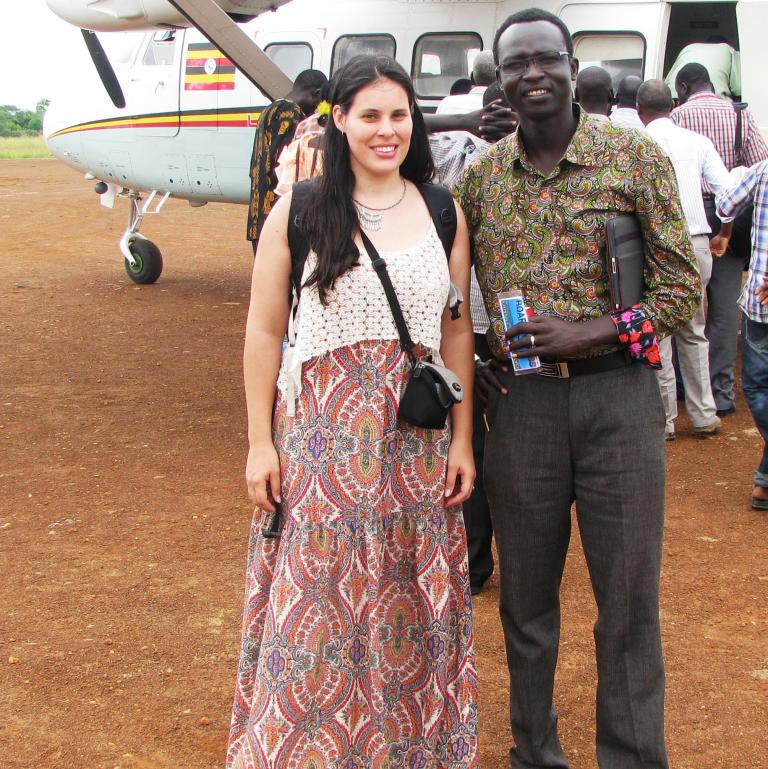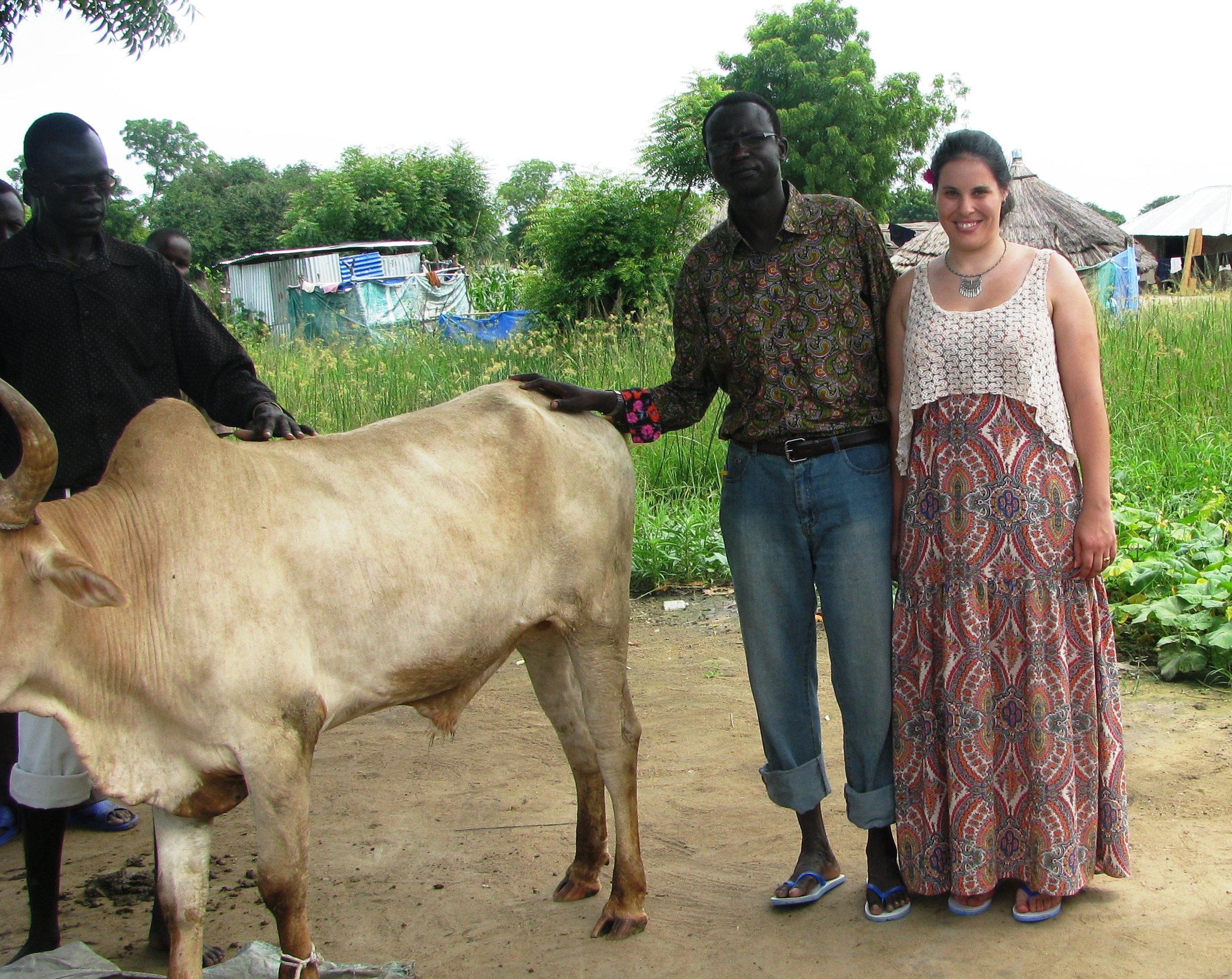Nyok Gor - Coming home after 26 years

It was Spring 1986 – just three years after my father was killed by the Khartoum regime. I was only eight years old. As my shallow memory recalls, it was night time and I had been playing with my friends when my home town, Malakal, came under attack. I was told to run, so I did. But I kept saying to the soldiers from the Sudan People’s Liberation Army that I needed to go back home and find my Mum, my brothers and sister.
‘You will find your family where we are going,’ I was told.
‘But where are we going?’ I said, very confused and scared.
‘You will see,’ came the unsatisfying reply.
After six long weeks of walking we reached Pinyadu, a makeshift refugee camp in Ethiopia. I still hadn’t seen my family and it was many years before I did. For the next five years I assumed a temporary family amongst boys from all over Southern Sudan. We schooled together and were trained by the Army. But then international politics shifted and we were no longer welcome in Ethiopia. We had to flee within 24 hours, swimming across a river to escape the soldiers chasing us. Many didn’t make it. I will never forget that day.
So began the next part of my long journey across Eastern Africa on foot. To cut a long, long story short, we walked from place to place for four years – regardless of international borders -- in the struggle to find safety, food and shelter. I was required to fight sometimes: not what I had ever imagined for my childhood.
Finally I was reunited with my mother and siblings in northern Kenya, at the world’s largest refugee camp, Kakuma. I lived and studied there for seven years, very grateful to be supported with a scholarship to gain my Kenyan Certificate of Secondary Education. When I had finished, I was offered the opportunity to live in Australia.
I was excited to utilise the education opportunities in Australia, and eventually to bring my mother and siblings over as well. In Melbourne I became involved with the network of Initiatives of Change. Here I also met my wife, Kathryn, whom I married last year. Australian-born, she was very happy to journey alongside me on this first trip back to South Sudan since my childhood. It came at such an important time: when South Sudan had just gained its independence in July 2011.

Kathryn and I had planned our trip to coincide with visit of an IofC team to South Sudan in September. As we boarded in Nairobi, we were pleased to connect with Mike and Jean Brown with African colleagues Nombulelo Khanyile, Amina Dikedi and Steve Kimaru, and to fly with them to Juba, the capital. This team, representing IofC International, came in response to the request of the Government of South Sudan for IofC to contribute to the healing and reconciliation process so desperately needed. Over 50 years the wounds from Africa’s longest running civil war run deep – between individuals, ethnic groups, families, religious groups and political factions.
The day after we landed in Juba, we met with 41 South Sudanese who have connected with IofC to consider a proposal drafted at the Global assembly in Caux, Switzerland. For me, it was a great opportunity to greet some senior government officials whom I had previously got to know during the Human Security Forum I attended in Caux, during July. And I was particularly pleased to meet with a number of young people who have formed an ‘IofC taskforce’ in South Sudan.
The meeting was chaired by the Vice President, Dr. Riek Machar Teny, with Presidential Advisors General Joseph Lagu and Tor Deng Mawien alongside him at the table. Madame Angelina Teny, wife of the Vice President, suggested the meeting be run in ‘a Caux format’ -- so everyone was given a chance to introduce her/ himself and to speak. After several hours, the Vice President moved that the proposal for a national campaign for reconciliation and good governance, starting next April, be adopted. It is a challenging agenda for IofC and all of us.
At dinner afterwards, Kathryn and I were not far from where Dr Riek and other leaders were seated with Mike Brown. Mike asked me to join them and describe some reconciliation work I have been doing with others of the diaspora in Australia – for instance how, after my cousin was killed in tribal conflicts in South Sudan last January, I had set out in Melbourne to establish a relationship of trust with a man of the opposing tribe, who had also lost relatives. It was a great moment. I did not expect to sit at a table with the Vice President! I was humbled, challenged and confronted by this man who, during the war, was responsible for a terrible massacre in Bor, my father’s village, in which my grandmother was killed. I’m still not sure how to reconcile those mixed emotions.
This pivotal meeting formed the basis for many more encounters during our stay in South Sudan. We managed to join the IofC team for a variety of follow-up meetings, getting to know people and plan future programmes. Kathryn and I were even invited to move to South Sudan more permanently to contribute towards this work! (We need to consider this request a little more, to decide how we can best contribute because there are just so many needs.)
After two nights in a hotel in Juba, I was very keen to meet with my mother’s sister, Nyantuol Kong. She asked us to stay with her and the family. I was so grateful, as staying in a hotel was not my idea of visiting family. And Kathryn also got to know them. We sat under the stars in the evenings feeling the warm breeze before we retired to sleep in our sturdy thatched hut. This was the real Africa!
Travelling north by small plane for 30 minutes, we also managed to visit some of my father’s relatives in Bor. Due to the wet weather, Bor was quite flooded. It was quite a new experience to wade through the flood waters to get to my family’s home, especially for Kathryn. Such times with my family really touched us – both in Juba and Bor. My family live simply, often struggling to make ends meet financially. Health care and education are difficult to access. But it was inspiring to feel so warmly welcomed and so well fed.
Since Kathryn and I have been back in Australia we have been pondering how best to support my family members and others like them. With so many needs, hundreds of programmes and organisations are already doing great work. IofC’s reconciliation work is meeting a huge need and we are keen to support this as we feel peace is needed at all levels of society in South Sudan.
We are also particularly keen to develop a programme for ourselves and other Australians to contribute to education costs for South Sudanese children who would otherwise miss out. I myself have benefitted so greatly from having a scholarship to access education. And I believe that this is one essential ingredient to bring about equity, peace and wellbeing to South Sudan’s future generations. We don’t know how else to contribute just now, but we are on the journey with this new nation because it is my home.
I long for South Sudan to recover from a long history of war and rebuild a lasting peace. I personally believe that the people of South Sudan at all levels need to find peace within themselves. Having friends alongside them on this journey of healing and reconciliation is one way to bring that peace.

